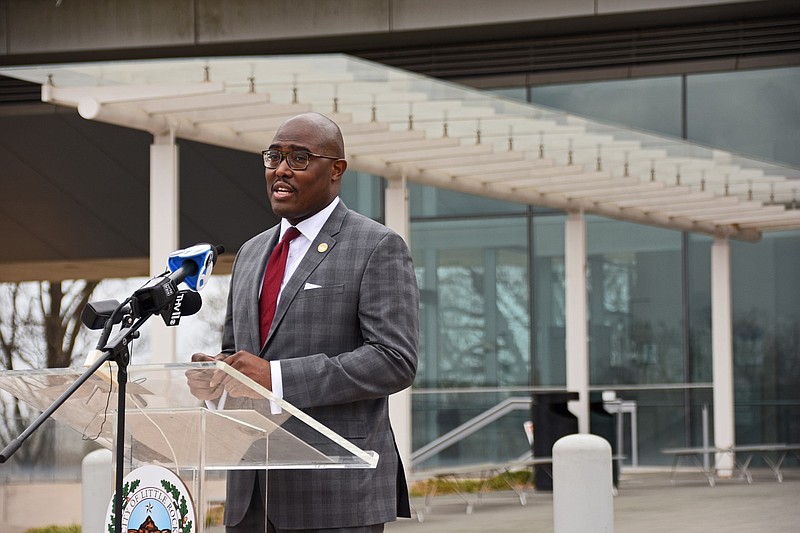Little Rock Mayor Frank Scott Jr. said Wednesday that the addition of $10 million for a new line-item on community-oriented policing in his revised "Rebuild the Rock" sales-tax package will fund more personnel for community outreach.
The funding would enhance efforts on community-oriented policing with additional officers, as well as mental health and social workers, he said.
Scott said officials expect that additional officers for the program could number "anywhere from five to 20."
However, it remains to be seen whether the additional police funding and other tweaks to Scott's sales-tax plan will satisfy members of the city Board of Directors who have expressed concerns about crime.
During a city board meeting Tuesday, Scott chose to defer a final vote among city directors on whether to set a July 13 special election for voters to consider his 1 percentage-point sales tax increase, which would push Little Rock's sales tax rate to 9.625%.
Additionally, the mayor announced several changes to the proposal after receiving feedback from city directors last week. Several city directors had raised questions about the plan's structure and referred to constituents' concerns about public safety during an uptick in violent crime in the city.
Because the city board recently approved funding a study of police staffing needs, the Police Department's leadership will get the opportunity to figure out what a city of Little Rock's size requires and "to incorporate community-oriented policing," Scott said in a phone interview Wednesday.
A little less than half of the department's 594 uniformed personnel work on patrol, Scott said, and the additional $10 million will help build out the department's community-oriented policing section.
He said the $10 million "helps us plan for the future for community-oriented policing that is evolving with a combination of officers and mental [health] and social workers."
The Police Department since 1992 has sought to adopt strategies under the rubric of community-oriented policing, which generally emphasizes more contact among police officers and members of the public to foster a proactive approach to crime and establish connections.
In Little Rock, those efforts have included bicycle-mounted officers, horseback patrols and officers on foot in neighborhoods.
Asked if he believes the additional money for police will encourage board members to vote yes on the package next week, Scott said, "It's always been our goal to present a package that's built on consensus. We share an understanding that public safety is a top priority for the city of Little Rock."
The added dollars for community-oriented policing will be on top of the portion of city expenditures -- close to half of Little Rock's general fund budget -- that already goes toward public safety, he said.
"Members of the board made requests to increase the funding from the sales-tax proposal, and we took time to increase it even more to be responsive to them," Scott said.
In addition to the $10 million allocation for community-oriented policing, Scott's revised plan adds $11 million for vehicle and apparatus replacement, bringing the 10-year total for the public-safety category to nearly $74 million compared with nearly $63 million in the first iteration of the plan.
Meanwhile, the line-item for public safety technology and operations was reduced by half to $10 million in the new version of the package.
The category of infrastructure also benefits from the revisions in Scott's plan, thanks in part to a new $5 million allocation for targeted community development. Also under the new plan, nearly $42 million would go toward street resurfacing over 10 years, an increase of roughly $12 million compared with the original proposal.
Those adjustments were at the expense of funding allocated for the Little Rock Zoo, which saw a reduction of $10 million in terms of the planned increase to its operating expenses over the next decade, as well as the package's early-childhood education component, where funding was reduced by $5 million for a 10-year total of $40 million.
During a city board meeting last week, Vice Mayor Lance Hines -- a frequent critic of the mayor and his appointed police chief, Keith Humphrey -- said he would vote against any sales-tax package that did not contain dedicated funding for the community-oriented policing program.
"We have gutted, at every turn, our [community-oriented policing program]," Hines said at the time.
He suggested $25 million as a minimum figure to fund dedicated community-oriented policing personnel on top of the department's sworn police officers.
In a phone interview Wednesday, Hines said the new line-item for community-oriented policing was "better" but that Scott "took the $10 million away from the operating [expenses] in the zoo."
He argued that the zoo's biggest issue with maintaining its accreditation was related to operating expenses, not capital investment. Scott's new proposal left the planned capital investment for the zoo unchanged at $30 million over the next decade.
Hines also noted that the amount of operating funding allocated for early-childhood education in the new proposal was larger than operating expenses for any other initiative with the exception of street resurfacing.
The early-childhood category includes initiatives like partnering with the Arkansas Department of Human Services' Division of Child Care and Early Childhood Education to defray families' costs and arranging technical assistance for private child care providers.
Asked if the reduction to the early-childhood category would come from any particular area proposed under the framework, Scott said no changes to the overall programming would take place.
Nevertheless, he acknowledged that "some shifts across categories will likely be required across the 10 years."
The decision to cut from the zoo's planned operating expenses under the new proposal was made in response to feedback from the board members who expressed a desire to tweak the zoo's portion, Scott said.
"Everything has always been aligned with ensuring that the zoo maintains its accreditation," Scott said.
